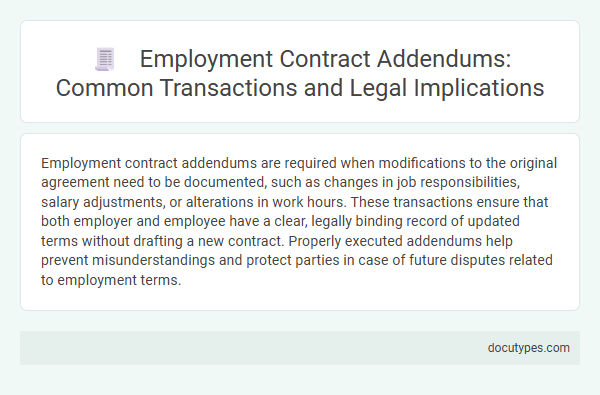Employment contract addendums are required when modifications to the original agreement need to be documented, such as changes in job responsibilities, salary adjustments, or alterations in work hours. These transactions ensure that both employer and employee have a clear, legally binding record of updated terms without drafting a new contract. Properly executed addendums help prevent misunderstandings and protect parties in case of future disputes related to employment terms.
Understanding Employment Contract Addendums
An employment contract addendum is a legal document used to modify or clarify the terms of an existing employment agreement. Understanding which transactions require an addendum helps both employers and employees maintain clear and enforceable contract terms.
- Change in Job Responsibilities - Modifications to an employee's role or duties typically necessitate an addendum to update the contract accordingly.
- Adjustment of Compensation - Any alterations in salary, bonuses, or benefits should be documented through an employment contract addendum for legal clarity.
- Extension of Contract Duration - Extending the term of employment requires an addendum to ensure both parties agree on the new timeline.
Employment contract addendums provide a formal way to record significant changes, protecting the rights and obligations of both employees and employers.
Common Scenarios Requiring Contract Addendums
What transactions require an employment contract addendum? Employment contract addendums are necessary when specific terms within the original contract need to be modified or extended. Common changes involve adjustments to job responsibilities, salary revisions, or alterations in work location.
When is an employment contract addendum commonly used? Employers often require addendums for promotions, role changes, or extended leave arrangements to ensure all new terms are clearly documented. These addendums protect the rights and obligations of both parties during evolving employment conditions.
How do contract addendums affect your employment agreement? An addendum serves as a legally binding update that supplements your existing contract without replacing it entirely. It provides clarity and formal consent to new employment terms while maintaining the original agreement's validity.
Legal Requirements for Valid Addendums
Employment contract addendums are necessary when modifying terms such as salary, job responsibilities, or work location. These transactions require clear documentation to ensure mutual agreement and legal enforceability.
Legal requirements for valid employment contract addendums include mutual consent from both employer and employee, a written format, and clear reference to the original contract. The addendum must specify the exact changes without contradicting existing contract provisions. You must retain a signed copy to protect your rights and avoid disputes.
Key Clauses in Employment Addendums
An employment contract addendum is necessary for modifying terms without rewriting the entire agreement. It ensures clarity and legal enforceability for changed employment conditions.
Key clauses in employment addendums define the specific adjustments and protect both parties' interests effectively.
- Scope of Work Changes - Specifies alterations to job duties or responsibilities to reflect updated roles accurately.
- Compensation Adjustments - Details salary, bonuses, or benefits modifications ensuring transparent pay structure revisions.
- Duration and Termination Clauses - Defines the updated time frame or termination conditions relevant to the employment changes.
Amending Salary and Compensation Terms
An employment contract addendum is required when there are changes to the original agreement, specifically regarding salary and compensation terms. Employers must clearly outline any amendments to payment structure, bonuses, or benefits to ensure legal compliance and mutual understanding. This addendum serves as a formal record, protecting both the employer and employee during contract modifications.
Modifications to Job Duties and Responsibilities
An employment contract addendum is necessary when there are significant modifications to job duties and responsibilities. These changes must be documented to ensure clear understanding between the employer and employee.
You need an addendum if your role expands, reduces, or shifts focus within the organization. This legal document protects both parties by outlining the updated scope of work and expectations.
Changes in Work Location or Remote Work Policies
| Transaction Type | Description | Relevance to Employment Contract Addendum |
|---|---|---|
| Change in Work Location | Modification of the employee's primary workplace, including relocation to a different office or city. | An employment contract addendum is required to reflect the new location, updating terms such as commute expectations, jurisdiction, and potential expense reimbursements. |
| Introduction of Remote Work Policies | Implementation of flexible work arrangements allowing employees to work from home or another remote site. | An addendum outlines specific conditions for remote work, such as equipment provision, working hours, confidentiality, and performance metrics. |
| Changes in Remote Work Eligibility | Adjustments to which employees are permitted to work remotely or changes in remote work frequency. | Requires an update via addendum to communicate new eligibility criteria, rules, and employee responsibilities under the revised policy. |
| Work Location Hybrid Models | Establishment of mixed work arrangements, combining on-site and remote work days. | An employment contract addendum details hybrid schedules, reporting expectations, and any impact on compensation or benefits. |
Term Extensions and Contract Renewals
Employment contract addendums are necessary for transactions involving term extensions and contract renewals. These changes modify the original agreement's duration, ensuring all parties acknowledge updated employment terms. You must use an addendum to legally document any extension or renewal of your employment contract.
Legal Risks and Compliance Issues
Employment contract addendums are essential when modifying terms to comply with evolving legal standards or business needs. Failure to properly document changes can expose employers and employees to significant legal risks and compliance issues.
- Change in Job Responsibilities - An addendum formally outlines updated duties, preventing disputes over role expectations and ensuring compliance with labor laws.
- Salary and Compensation Adjustments - Documenting pay changes protects both parties and helps meet regulatory requirements regarding wage transparency.
- Extension or Modification of Employment Duration - Formalizing contract period changes reduces risks of wrongful termination claims and ensures alignment with employment regulations.
What Transactions Require an Employment Contract Addendum? Infographic

